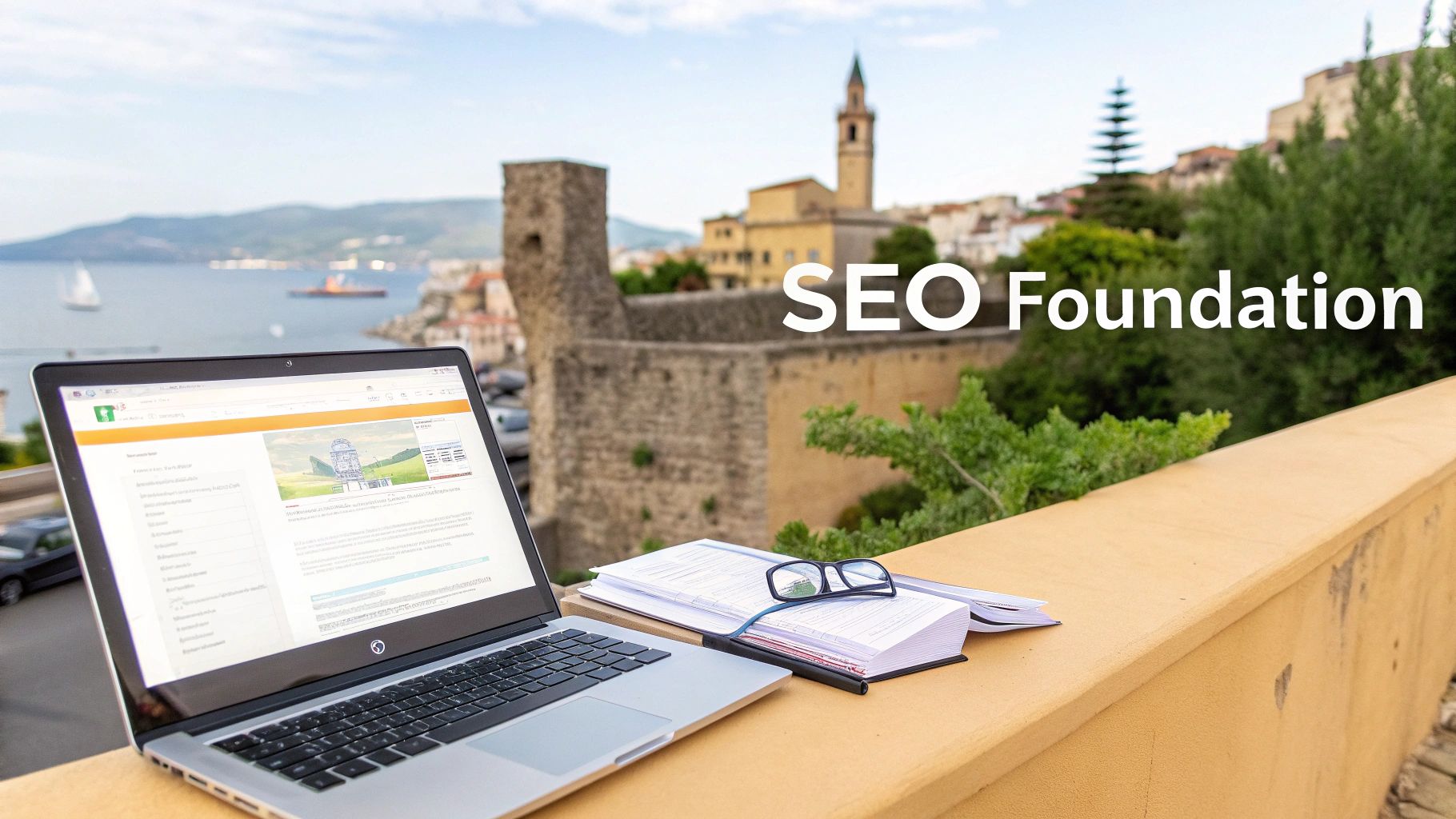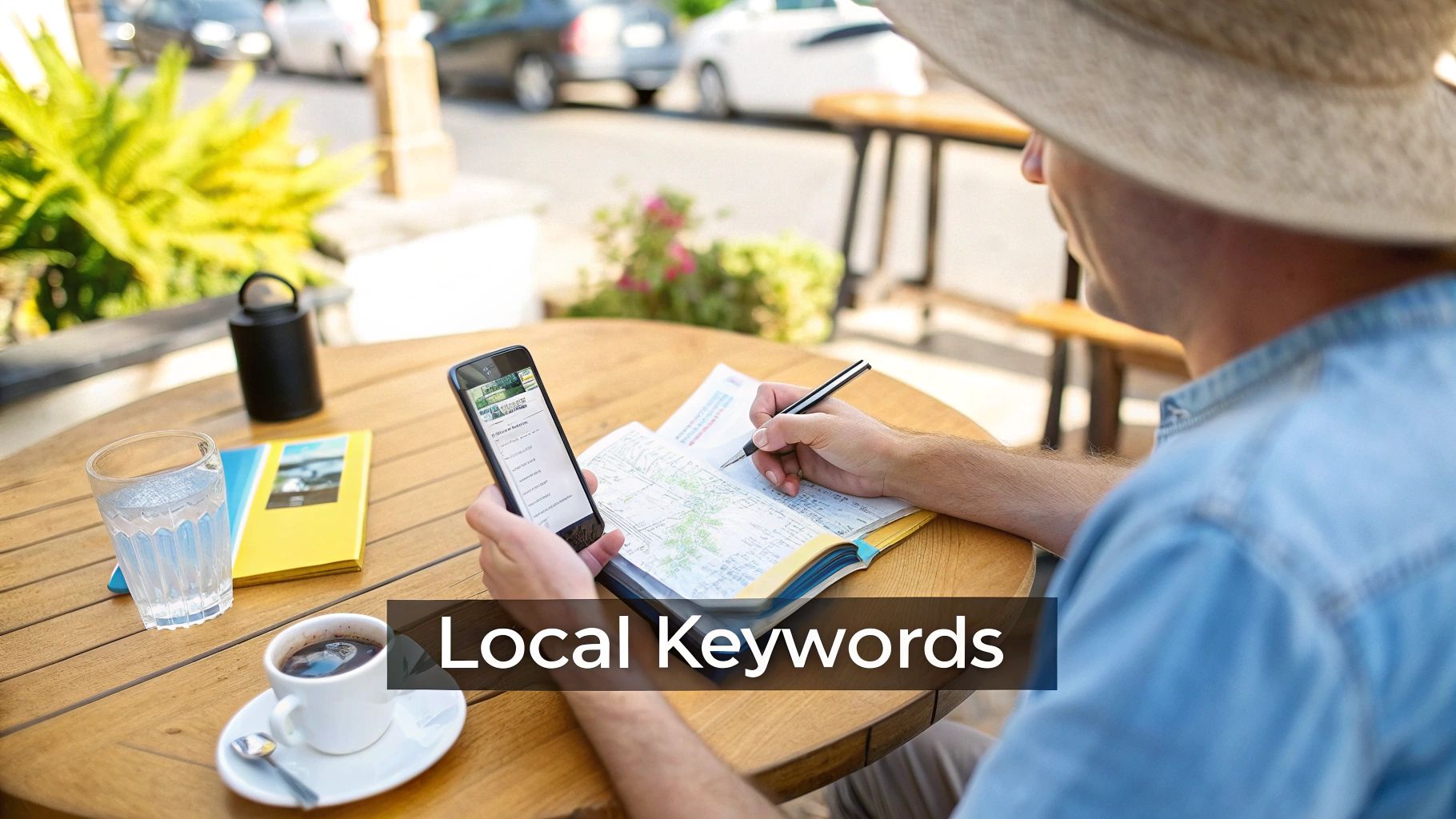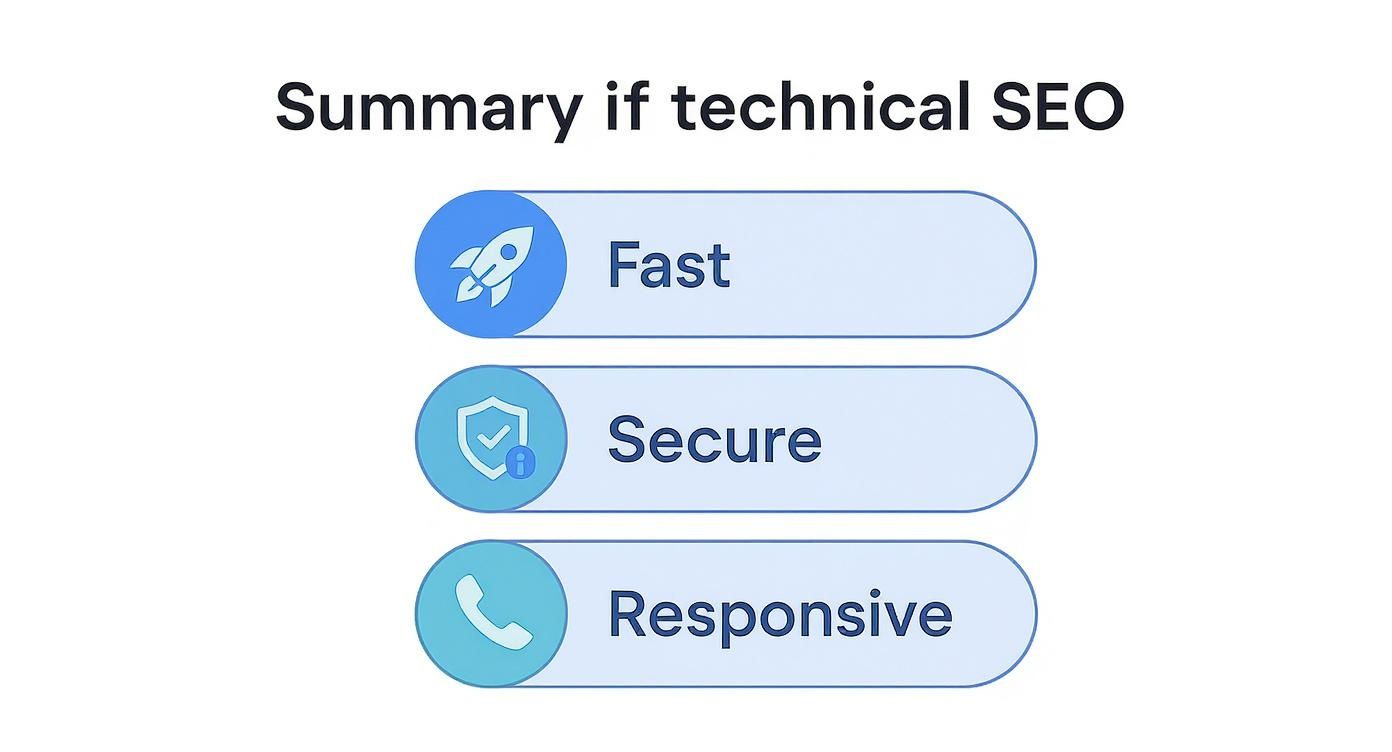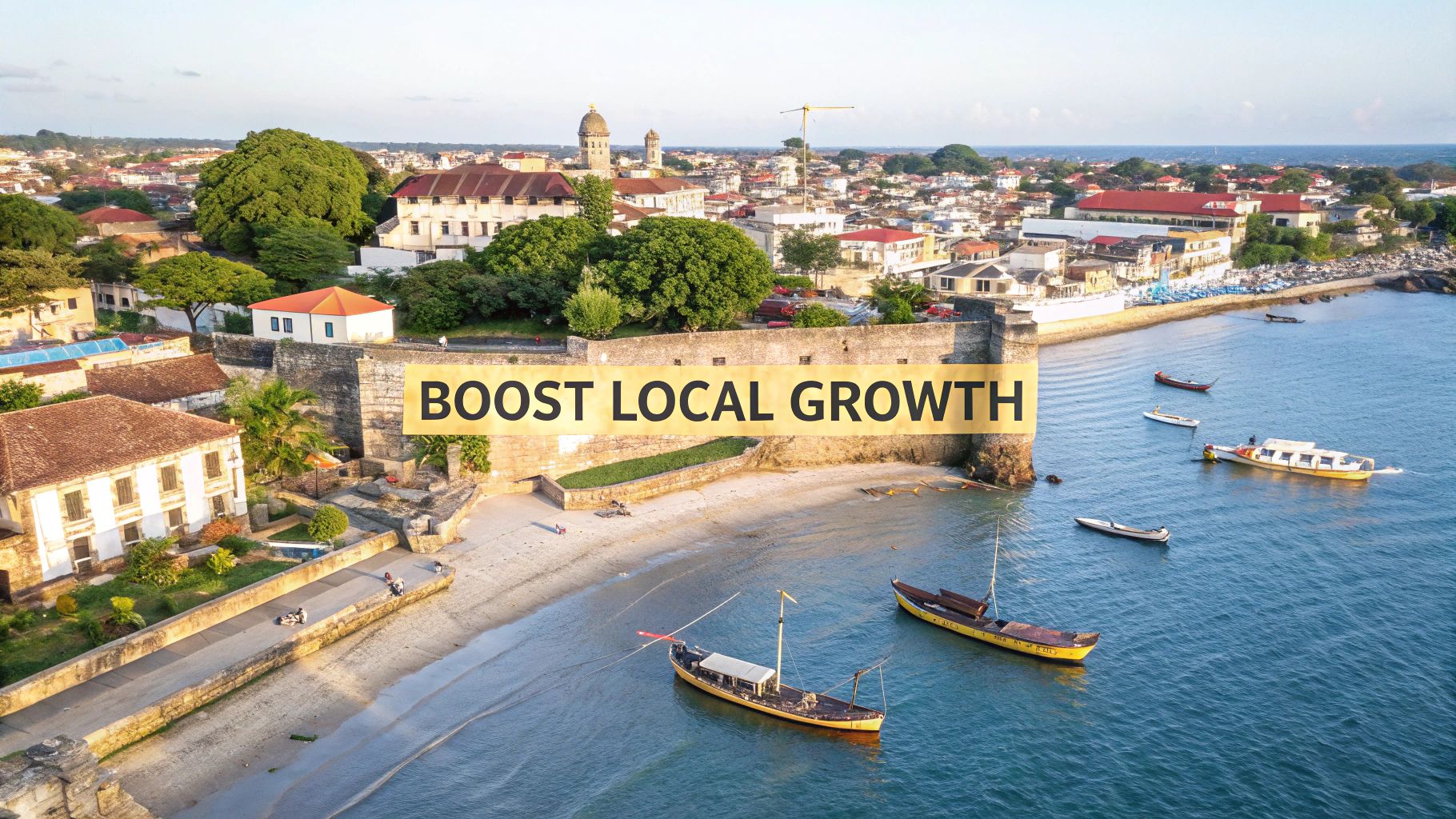Trying to show up on Google in Zanzibar isn't like anywhere else. You're dealing with a unique mix of international tourists planning their dream holiday and local residents looking for the best spots in town. Nailing your SEO optimization in Zanzibar means building a solid online presence that speaks to both.
It comes down to smart keywords, a non-negotiable mobile-first website, and a real feel for how people search for things here. Get this right, and your hotel, tour company, or restaurant won't just be visible—it'll be the obvious choice.
Building Your SEO Foundation in Zanzibar

Before you even think about keywords or backlinks, you need to get your groundwork right. A winning strategy starts with one simple question: who are you trying to reach? A European traveler meticulously planning a 10-day safari and beach combo searches very differently than a local in Stone Town looking for a new dinner spot.
Your business goals have to drive every single SEO decision you make. "More visibility" is a vague wish, not a goal. What you're really after are tangible results, like:
- More direct bookings for your boutique hotel.
- A flood of inquiries for your spice farm tours.
- Higher foot traffic to your beachside café.
- An increase in form submissions from potential clients.
When you tie these outcomes to your online efforts, you stop wasting time and start making every move count.
Your Initial SEO Audit Checklist for Zanzibar
The first real step is to see where you stand right now. Think of it like a health checkup for your website before you start a new fitness routine. An audit gives you a clear baseline and shines a light on the most immediate opportunities for improvement.
We've put together a quick checklist to help you evaluate your website's readiness for the Zanzibar market.
| Audit Area | Key Checkpoint | Why It Matters for Zanzibar |
|---|---|---|
| Mobile-Friendliness | Does your site load quickly and look great on a smartphone? | Around 80% of searches here happen on mobile. A poor mobile experience makes you practically invisible to most customers. |
| Local Signals | Is your address, phone number, and location information consistent everywhere? | Google needs to see you're a legitimate local business to show you in map results for "restaurants near me." |
| Content Relevance | Does your content answer questions for both tourists (e.g., "best time to visit")? | You're serving two different audiences. Your content needs to be useful for someone in London and someone in Nungwi. |
| Keyword Targeting | Are you using keywords in both English and Swahili? | Many local searches happen in Swahili. Ignoring it means missing out on a huge chunk of the resident market. |
| Page Speed | Does your site load in under 3 seconds, especially on slower connections? | Internet speeds can be inconsistent. A slow site will frustrate users and cause them to leave before they even see your offer. |
This initial assessment will uncover the low-hanging fruit—those quick fixes that can give you a boost while you map out a longer-term plan. For a deeper dive into how Google ranks local businesses, our guide on the local search optimization algorithm is a great next step.
Key Takeaway: Your website must be flawless on a smartphone. A slow, clunky mobile experience is the fastest way to lose the vast majority of your potential customers, who are almost certainly searching on the go.
Finding the Keywords That Actually Get You Bookings

Let's be honest: effective SEO optimization in Zanzibar all comes down to understanding what your potential customers are typing into Google. The right keywords are the bridge connecting someone dreaming of an island getaway to your tour, hotel, or restaurant. This isn't about guesswork; it's about digging into the real phrases and questions people use, both while they're still planning from thousands of miles away and once their feet are on the sand.
A classic mistake I see all the time is businesses chasing huge, competitive terms like "Zanzibar hotel." It seems logical, but it’s like casting a massive net into the open ocean. You might get lucky, but you're missing the schools of valuable fish swimming in very specific spots. The real gold is in long-tail keywords—those longer, more detailed phrases that signal someone is ready to book.
Think Like a Traveler, Not Just a Business Owner
Step into your customer's shoes for a minute. Someone in the early "dreaming" phase might search for "best time to visit Zanzibar." That's an informational search. But a visitor who is much closer to pulling out their credit card? They're using specific, transactional phrases. This is where you can win.
- Forget "Zanzibar tours." Instead, target "private dhow sunset cruise Kendwa."
- "Restaurants" is too broad. Go for "best seafood restaurant Stone Town with ocean view."
- Move on from "accommodation." Focus on "family-friendly bungalow Jambiani beach."
These long-tail keywords might have less search traffic, but their conversion rate is exponentially higher. The person searching for a "family-friendly bungalow" knows exactly what they need. If you offer that, you've practically closed the deal.
And don't forget about Swahili. While most tourists will search in English, weaving in terms like "safari ya bahari" (sea safari) or "hoteli Paje" (Paje hotel) can capture savvy travelers looking for a more authentic experience, not to mention local residents.
Create Your Keyword Blueprint
A keyword map is your strategic plan of attack. It’s the process of assigning a primary keyword and a few secondary ones to every single page on your website. This gives each page a distinct job to do.
For example, your homepage might target a broader term like "[Your Business Name] Zanzibar," while a specific service page should be laser-focused on a long-tail keyword like "Zanzibar spice farm tour with cooking class." This clarity tells Google exactly what each page is about, making you a more relevant result.
My Go-To Tip: Use the free tools Google gives you. The "People Also Ask" box and the "Related Searches" at the bottom of the search results are absolute goldmines. A quick search for "Nungwi snorkeling" might show you related queries like "Nungwi turtle sanctuary" or "Mnemba Atoll snorkeling trip," instantly giving you fresh ideas for blog posts or service pages.
By building out content that answers these very specific questions, you're not just another website. You're becoming an authoritative resource that Google trusts. This strategic approach to SEO optimization in Zanzibar is what separates the businesses that get found from the ones that get lost in the noise.
Creating Content That Connects and Converts
Once you have your keyword map, it's time to get creative. This is where you move beyond data and start crafting content that genuinely speaks to your audience. Let’s be honest: effective SEO optimization in Zanzibar isn't about jamming keywords onto a page. It's about answering the burning questions travelers have and painting a picture of the adventure that awaits them. Every single thing you publish, from a service page to a blog post, needs to be a valuable resource.
Think of your title tags and meta descriptions as the digital equivalent of a shop window. They’re the first thing anyone sees in the search results, so you have to make them count. Ditch the generic "Tours in Zanzibar" and go for something that sparks curiosity, like "Unforgettable Dhow Sunset Cruises in Kendwa | Your Zanzibar Adventure." See the difference? One is a label; the other sells an experience.
The meta description is your thirty-second pitch. It's your shot to convince a searcher that your page holds the key to their perfect trip, making them click your link instead of the dozen others on the page.
Crafting Content for the Zanzibar Traveler
You have to think bigger than just listing what you sell. The brands that win at SEO in Zanzibar become the go-to experts for anyone even thinking about a trip to the island. You do this by building trust and authority, one helpful piece of content at a time.
Get into the mindset of a traveler and create blog posts that solve their problems and build excitement.
Here are a few ideas that flat-out work:
- Detailed Guides: "A Food Lover’s Guide to Stone Town" or "Choosing the Best Dive Site in Zanzibar" are perfect for people actively researching their options.
- Itinerary Posts: Something like "The Perfect 7-Day Zanzibar Itinerary for Couples" attracts visitors who are deep in the planning phase and ready to book.
- Local Insights: Build a real connection with content like "10 Swahili Phrases Every Traveler Should Know." It shows you're an authentic local source, not just another faceless company.
When you create this kind of genuinely useful content, you'll find your target keywords fit in naturally. More importantly, you position your brand as a trusted local expert. This strategy pulls in visitors at every stage of their journey, from the early "just dreaming" phase right up to the moment they pull out their credit card.
Key Insight: Make your content's primary job to be useful. When you focus on genuinely helping your audience, the SEO benefits—like better rankings, more time spent on your site, and organic backlinks—will follow.
Getting visitors to your site is only half the battle. Once they're there, you need to turn that interest into bookings. Be sure to explore proven conversion rate optimization techniques to transform that hard-won traffic into real business. This is a critical piece of SEO optimization in Zanzibar that directly impacts your bottom line.
Nail Your Technical SEO for a Faster Zanzibar Site
Let’s get real. Beyond the pretty pictures and catchy Swahili phrases, the technical health of your website is a massive deal for SEO optimization Zanzibar. In a place where internet speeds can be… unpredictable, a slow, clunky website is the fastest way to lose a potential customer. A technically solid website isn't just some nice-to-have feature; it's the very engine that powers your whole online presence.
The idea is simple: make your site fast, secure, and dead simple for both people and search engines to navigate. This all starts with page speed. I can't tell you how many times I've seen beautiful sites tank because of massive, uncompressed images. Compressing those stunning photos of Kendwa's beaches before you upload them can slash your load times. That's a game-changer for a tourist browsing on a shaky mobile data plan.
Speed and Security Should Be Your Top Priorities
A fast website keeps people from bouncing, but a secure one builds the trust you need to actually make a sale. Having an SSL certificate—the little padlock that gives you "HTTPS" in your URL—is table stakes now. Google pretty much demands it. It encrypts the data between your site and the user, telling them their info is safe. If you're taking any kind of bookings or payments, this is absolutely non-negotiable.
Here are a few technical fixes you should tackle right away:
- Image Optimization: Seriously, do this. Use tools to compress your images without turning them into pixelated messes. Modern formats like WebP offer way better compression and are supported almost everywhere now.
- Turn On Caching: Browser caching is your best friend. It stores parts of your site on a visitor's device, so when they come back, it doesn't have to reload everything from scratch. It makes a huge difference.
- Make Sure It’s Mobile-Perfect: Your site has to look and work flawlessly on a smartphone. Don't just resize your browser window to check—actually pull it up on a phone. Tap every button, fill out every form, and test the navigation to guarantee it’s a smooth experience.
Getting these fundamentals right is critical. To build a site that's fast, secure, and easy for Google to crawl, mastering technical SEO strategies is essential.
Stand Out from the Crowd with Structured Data
This is where you can get a real edge. Structured data, also called schema markup, is basically a special vocabulary you add to your site's code to help search engines understand your content on a deeper level. For a tourism business in Zanzibar, this is pure gold.
It’s what transforms a boring blue link in Google into an eye-catching "rich snippet" complete with star ratings, prices, and even tour availability.
A hotel, for instance, can use schema to show off its 5-star ratings and price range right there in the search results. A tour operator can display the duration and cost of a spice farm tour. This kind of visibility makes your listing so much more compelling and can seriously boost the number of people who actually click through to your site.
I worked with a local tour operator who was struggling to get noticed. We focused entirely on technical wins: converting images to WebP, optimizing the server for faster load times, and getting that crucial HTTPS lock. Within six months, they hit the #1 spot for high-value keywords like 'Zanzibar snorkeling tour Nungwi'. It’s proof that the technical stuff really moves the needle.
By nailing these technical elements, you're building a rock-solid foundation. A fast, secure, and mobile-friendly site doesn't just rank better—it provides a far better user experience that turns lookers into bookers. If you want to dive deeper, we’ve put together a guide with more powerful website performance optimization tips you can implement today.
Winning The Local Search Game In Zanzibar
For any business in Zanzibar, whether you're running a beachside café in Paje or a tour company out of Stone Town, your Google Business Profile (GBP) isn't just a listing. It’s your digital front door.
A massive 46% of all Google searches are for local information. When a tourist pulls out their phone and types in "best seafood near me," your GBP is what decides if you even show up as an option. Honestly, getting this right is the single most important thing you can do for your SEO optimization Zanzibar efforts.
Think of an un-optimized GBP like a sign with faded paint. It might have your name on it, but it doesn't build confidence or tell a customer anything useful. A fully optimized profile, though? That’s a vibrant, welcoming billboard that screams credibility and pulls people in.
Make Your Google Business Profile Irresistible
First, you have to claim and verify your profile. But that's just the start. The real work is in the optimization—making your listing a rich, compelling snapshot of your business.
- Choose the Right Categories: Get specific. Instead of just "Restaurant," pick "Seafood Restaurant" or "Italian Restaurant." This simple tweak helps Google match you to much more precise searches.
- Upload High-Quality Photos: Show off everything. Post pictures of your stunning ocean views, your most popular dishes, your smiling staff, and your happy customers. A strong visual portfolio is often the deciding factor for someone choosing between you and a competitor.
- Encourage and Respond to Reviews: Positive reviews are pure gold. They are a huge ranking factor and build immense trust. Gently encourage satisfied customers to leave a review, and always respond to feedback—both good and bad. It shows you're engaged and that you care.
To really see the difference, let’s compare a basic profile to a fully optimized one. It’s the gap between being invisible and being the obvious choice.
Google Business Profile Optimization Levels
| Feature | Basic Profile (Low Impact) | Optimized Profile (High Impact) |
|---|---|---|
| Categories | Single, generic category ("Hotel") | Multiple, specific categories ("Beach Resort," "Honeymoon Hotel") |
| Photos | A few low-res, outdated images | 20+ high-quality photos and videos, updated regularly |
| Services/Products | Left blank or incomplete | Detailed list of all services, dishes, or tours with descriptions and prices |
| Reviews | A handful of old reviews, no responses | Consistent flow of new reviews with thoughtful owner responses |
| Posts | Never used | Weekly posts about events, special offers, or new menu items |
| Q&A | Unanswered questions from users | Proactively populated with FAQs and answered promptly |
An optimized profile doesn't just look better; it actively works to bring you more customers by signaling to Google that you're a relevant, active, and trusted business.
The Power of Local Citations
Beyond your GBP, you need to build local citations. These are just mentions of your business's name, address, and phone number (NAP) on other websites and in local directories. Consistency here is absolutely critical.
Every time a reputable site like TripAdvisor, a local Zanzibar tourism board, or a travel blog lists your business correctly, it sends a powerful signal of legitimacy to Google. It’s like getting multiple trusted locals to vouch for you, reinforcing that you are a genuine part of the community.
This authority dramatically increases your chances of appearing in the coveted "local pack"—those top three map listings in the search results that get all the clicks.
This infographic breaks down the core elements you need for a strong online presence in Zanzibar.

As you can see, a fast, secure, and mobile-friendly website is the technical backbone that supports all your local SEO work.
Key Takeaway: An optimized GBP and consistent local citations aren't optional; they are the foundation of local search success. Nearly 88% of consumers who search for something local on their phone will visit or call a business within a day. Capturing this high-intent traffic starts with a flawless local presence.
Building this authority takes time, but the payoff is immense. To get a deeper understanding of how search engines interpret these signals, check out our detailed guide on local SEO services. By focusing on these local search fundamentals, you ensure your business is the one that gets found when customers are ready to spend.
Common Questions About SEO in Zanzibar
If you're digging into SEO for the first time, especially in a market as unique as Zanzibar, you're bound to have questions. Business owners I talk to are always wondering where to start, what to focus on first, and what kind of results they can realistically expect.
Let's clear up some of the most common questions. Getting straight answers helps you put your time and money where they’ll make the biggest impact.
How Long Does SEO Take to Show Results in Zanzibar?
This is the big one, and the honest answer is that SEO is a marathon, not a sprint. While you might see a small, immediate boost from a few quick technical fixes, a solid SEO optimization Zanzibar strategy usually takes about 4-6 months to start delivering real, measurable results.
The first couple of months are all about laying the groundwork—sorting out technical glitches, beefing up your Google Business Profile, and building out essential content. You can usually expect to see some meaningful movement in your rankings and traffic around the four-month mark. By six months, you should be competing for top spots for your most important service keywords.
Key Insight: Consistency is everything. The businesses that win in the long run treat SEO as a core part of their operations, not just a one-off project. Sustainable growth comes from continuous, steady effort.
Should I Use Swahili Keywords in My SEO Strategy?
Absolutely. Not using Swahili is a huge missed opportunity. While English is crucial for grabbing the attention of international tourists planning their trips from home, a hybrid keyword approach is what really works here. It tells Google you’re a legitimate local business, not just another faceless international brand.
When you weave in Swahili phrases like 'hoteli Zanzibar' (Zanzibar hotel) or 'safari ya bahari' (sea safari), you connect with two critical groups:
- Local Residents: A growing number of Zanzibaris are using search engines to find local services.
- Authenticity-Seeking Travelers: Many tourists use local terms to find more authentic, less commercialized experiences once they're on the island.
This dual-language strategy expands your reach and cements your local relevance, which is a massive signal to Google.
Is SEO Better Than Paid Ads for My Business?
This isn't really an either/or question. Think of SEO and paid ads (like Google Ads) as two different tools that work best together. Paid ads are incredible for getting immediate visibility. If you’re launching a new tour package or have a last-minute seasonal deal, ads can put you right at the top of Google, instantly.
SEO, on the other hand, is about building long-term, organic authority. Once you earn a high ranking for a keyword, you get a steady stream of "free" traffic from it, day in and day out, without paying for every single click. Over time, the return on investment from SEO almost always beats paid ads.
A smart strategy uses paid ads for those short-term boosts while you invest in an SEO foundation that will drive sustainable growth for years to come.
What Is the Most Important SEO Tactic for a Tourism Business?
For any tourism business in Zanzibar—whether you run a hotel, a restaurant, or a tour company—the single most critical tactic is a fully optimized Google Business Profile (GBP). This is non-negotiable.
Think about it: the vast majority of travelers are on their phones, making location-based searches like 'tours near me' or 'best restaurants in Stone Town'. A strong GBP with accurate info, great photos, and a steady flow of positive reviews is what gets you seen on Google Maps and in the local search "map pack." That's where most of your customers are going to find you.
Ready to stop guessing and start ranking? The team at Up North Media specializes in data-driven SEO strategies that deliver real results. We help businesses in Zanzibar and beyond connect with their ideal customers and achieve sustainable growth. Schedule your free consultation today!
